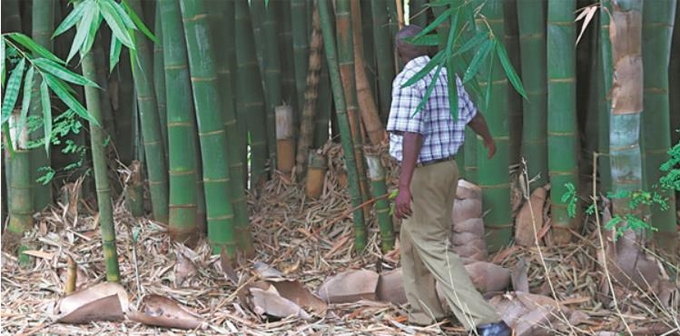May 29, 2025 | 15:51 GMT +7
May 29, 2025 | 15:51 GMT +7
Hotline: 0913.378.918
May 29, 2025 | 15:51 GMT +7
Hotline: 0913.378.918

A worker inspects a bamboo forest in central Kenya.
A retired public works official, Mayobo's farmland is near the river, which originates in Kenya's northwestern highlands and drains into Lake Victoria, Africa's largest freshwater body.
Four years ago, Mayobo took a proactive step by planting hundreds of bamboo plants on his farm after learning about the tree's flood-mitigating potential.
"I was motivated to venture into bamboo farming after training and research on how it could protect my farm from floods," Mayobo told Xinhua News Agency in a recent interview.
Today, the bamboo plants not only shield his farm from seasonal floods, but have also rejuvenated the soil, allowing him to grow crops such as maize, legumes, bananas and millet.
Mayobo is one of many smallholder farmers in western Kenya's flood-prone areas set to benefit from a bamboo agroforestry initiative funded by the Chinese Academy of Sciences through its Sino-Africa Joint Research Center.
The project is implemented by the United Nations Environment Programme's affiliated International Ecosystem Management Partnership in collaboration with local partners.
Dubbed "Ecosystem Restoration for Enhancing Livelihoods and Addressing Climate Change: China-Kenya Cooperation on Bamboo Technology Transfer", the project promises flood protection, income generation and improved resilience for local farmers and fishermen.
Under this initiative, Mayobo and other farmers have received training in bamboo cultivation, helping them establish nurseries and secure seedlings for replanting in flood-prone zones.
Samuel Juma Magoba, an elderly farmer involved in the project, has cultivated bamboo on his one-acre (0.405-hectare) farm and found new income opportunities by selling bamboo for furniture, ornaments, utensils and compost.
He recalled the severe flood damage he witnessed in his youth in his village near the Nzoia River basin — devastating events that have notably decreased since local farmers started planting bamboo along the riverbanks.
According to Dennis Otieno Ochuodho, a senior researcher at Jaramogi Oginga Odinga University of Science and Technology in Kenya, a project partner, the bamboo agroforestry project offers an effective, nature-based solution to climate-induced flooding.
Ochuodho said the project aims to expand research, training and technology transfers in bamboo farming, restore the degraded Nzoia River basin, and enhance food security through mixed cropping systems. A large-scale bamboo plantation, he added, will protect native species, serve as a carbon sink and supply raw materials for herbal medicines, supplements and roofing.
Despite her advanced age, Alice Makhulo's passion for cultivating bamboo on her seven-acre farm near a swamp remains undiminished, thanks to the economic and environmental benefits she has reaped from the vegetation.
"Even my children and grandchildren appreciate the cool breeze from the mature bamboo plants. I have also been selling bamboo stems to local furniture makers," Makhulo said.
As part of the China-funded bamboo agroforestry initiative, more than 200 farmers will receive training in sustainable bamboo cultivation, which also includes a 25-hectare demonstration site to showcase ecological restoration through the planting of this iconic tree species.
Wang Guoqin, program manager at UNEP-IEMP, emphasized that by stabilizing the Nzoia River banks, the project not only curtails flooding, but also enhances local livelihoods by combining food crops with bamboo and creating natural products for sale.
Leveraging Chinese bamboo technology and expertise, the initiative aims to regenerate degraded landscapes, conserve water resources, and improve climate resilience for river communities, Wang added.
Symprose Anyango, coordinator of Eco Green Kenya, a conservation lobby, noted that communities along the Nzoia River have embraced the project, particularly women, saying: "Bamboo has in particular been of huge benefit to women, who suffer most from climate change. They are using bamboo to revive traditional weaving and earn an additional income."
(Xinhua)
/2025/05/25/4127-3-073637_820.jpg)
(VAN) Thanks to the promotion from an FAO-implemented project, vegetable production in greenhouses in Moc Chau has seen strong development, from 1.5 hectares in 2021 to nearly 50 hectares in 2024.

(VAN) FAO has recently supported USD 140,000 to implement the project 'Risk mitigation human-animal interface risks through disease control initiatives in pig farming.'

(VAN) The People's Committee of Tra Vinh province has approved an adjustment to the investment policy for the Green Hydrogen Plant project, increasing its area to approximately 52.76 hectares.
![Reducing emissions from rice fields: [2] Farmers’ commitment to the soil](https://t.ex-cdn.com/nongnghiepmoitruong.vn/608w/files/news/2025/05/05/dsc08881jpg-nongnghiep-140632.jpg)
(VAN) Clean rice cultivation model in Thuong Tan commune, Bac Tan Uyen district, is assisting local residents in achieving sustainable agriculture by substantially reducing costs, increasing productivity, and protecting the environment.

(VAN) At the conference to disseminate Resolution No. 68, AgriS introduced its digital agricultural ecosystem and reaffirmed its commitment to accompanying the Government in promoting private sector development and sustainable agriculture.

(VAN) 'Blue Ocean - Blue Foods' initiative is designed to restore marine ecosystems and establish sustainable livelihoods for local communities by cultivating a minimum of 1,000 hectares of cottonii seaweed in the first three years.
/2025/05/21/4642-3-112707_603.jpg)
(VAN) The V-SCOPE project has made direct contributions to three out of six pillars of the Comprehensive Strategic Partnership between Vietnam and Australia.